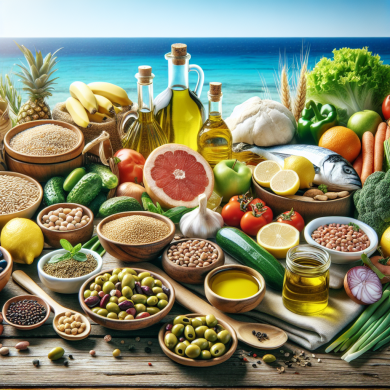Avoiding Common Mediterranean Diet Mistakes
Introduction
The Mediterranean diet is celebrated for its health benefits, including reducing the risk of heart disease, improving brain function, and promoting longevity. Originating from the traditional eating patterns of countries bordering the Mediterranean Sea, this diet emphasizes the consumption of fruits, vegetables, whole grains, legumes, nuts, and olive oil, with moderate consumption of fish, poultry, and dairy, and limited intake of red meat and sweets. However, despite its simplicity and health benefits, many people make common mistakes when trying to adopt this diet. This article aims to highlight these pitfalls and guide readers on how to avoid them to fully reap the benefits of the Mediterranean lifestyle.
Mistake 1: Overlooking Portion Control
One of the fundamental errors people make when following the Mediterranean diet is neglecting portion control. While this diet encourages the consumption of healthy foods, it does not imply that one can consume unlimited quantities without consequences. Overeating, even healthy foods like nuts and olive oil, can lead to weight gain and negate the diet’s health benefits.
Solution
To avoid this mistake, it is essential to practice mindful eating. Pay attention to hunger cues and serve appropriate portions. Use smaller plates and bowls to help control portion sizes, and try to balance your plate with a variety of food groups rather than overloading on one type.
Mistake 2: Misunderstanding the Role of Fat
A common misconception about the Mediterranean diet is that it is a low-fat diet. In reality, it includes a significant amount of healthy fats, primarily from sources like olive oil, nuts, and fatty fish. However, some people misinterpret this as permission to consume large amounts of any type of fat, including unhealthy saturated and trans fats.
Solution
Focus on incorporating healthy fats into your diet. Use extra virgin olive oil as your primary fat source, and include foods like avocados, nuts, and seeds. Avoid or limit consumption of butter, margarine, and highly processed oils. Additionally, prioritize fatty fish like salmon and sardines for their omega-3 fatty acids, which are beneficial for heart health.
Mistake 3: Ignoring the Importance of Vegetables
Vegetables are a cornerstone of the Mediterranean diet, yet many people do not consume enough of them. The diet emphasizes a high intake of a variety of vegetables, which provide essential vitamins, minerals, and fiber. Skipping vegetables or not including a diverse range can lead to nutrient deficiencies.
Solution
Aim to fill half your plate with vegetables at each meal. Experiment with different cooking methods, such as roasting, grilling, or steaming, to keep your meals interesting. Incorporate a wide variety of colors and types of vegetables to ensure you’re getting a range of nutrients.
Mistake 4: Consuming Too Much Red Meat
While the Mediterranean diet allows for some consumption of red meat, it should be limited. Many people make the mistake of eating red meat more frequently than recommended, which can increase the risk of heart disease and other health issues.
Solution
Limit red meat to no more than a few times a month. Instead, focus on consuming fish, poultry, and plant-based proteins such as legumes and beans. When you do eat red meat, choose lean cuts and keep portion sizes small.
Mistake 5: Overindulging in Wine
Moderate wine consumption, particularly red wine, is a part of the Mediterranean diet and is often highlighted for its potential heart health benefits. However, the key is moderation. Some people may consume too much wine, thinking it is beneficial, but excessive alcohol intake can have detrimental health effects.
Solution
If you choose to drink wine, limit your intake to no more than one glass per day for women and two for men. It’s also important to note that if you do not currently drink alcohol, there’s no need to start for the sake of following the Mediterranean diet.
Mistake 6: Forgetting About Whole Grains
Whole grains are an essential component of the Mediterranean diet, providing fiber and important nutrients. However, many people either neglect this component or choose refined grains over whole grains.
Solution
Incorporate whole grains such as quinoa, brown rice, bulgur, and whole wheat pasta into your meals. Read labels carefully to ensure you are choosing whole grain products rather than refined ones. Whole grains should replace refined grains in your diet to maximize health benefits.
Mistake 7: Neglecting Physical Activity
The Mediterranean lifestyle is not just about diet; it also includes regular physical activity. Some people focus solely on the dietary aspects and ignore the importance of exercise, which is crucial for overall health and well-being.
Solution
Incorporate regular physical activity into your routine. Aim for at least 150 minutes of moderate aerobic exercise, such as brisk walking, cycling, or swimming, each week. Additionally, include strength training exercises to maintain muscle mass and support overall health.
Mistake 8: Overlooking Social and Cultural Aspects
A vital component of the Mediterranean diet is the social and cultural aspects of eating. Meals are often enjoyed with family and friends, fostering a sense of community and enjoyment that contributes to overall well-being.
Solution
Make meals a social event whenever possible. Share meals with family and friends, which can enhance your enjoyment of food and encourage mindful eating. Take time to savor and appreciate the flavors and textures of your meals.
Conclusion
The Mediterranean diet offers numerous health benefits, but to fully reap these rewards, it’s important to avoid common mistakes. By practicing portion control, focusing on healthy fats, consuming a variety of vegetables, limiting red meat, moderating wine consumption, choosing whole grains, incorporating physical activity, and embracing the social aspects of meals, you can successfully adopt the Mediterranean lifestyle. Remember, it’s a lifestyle change rather than a strict diet, so make gradual adjustments and enjoy the journey to improved health and well-being.














Add comment